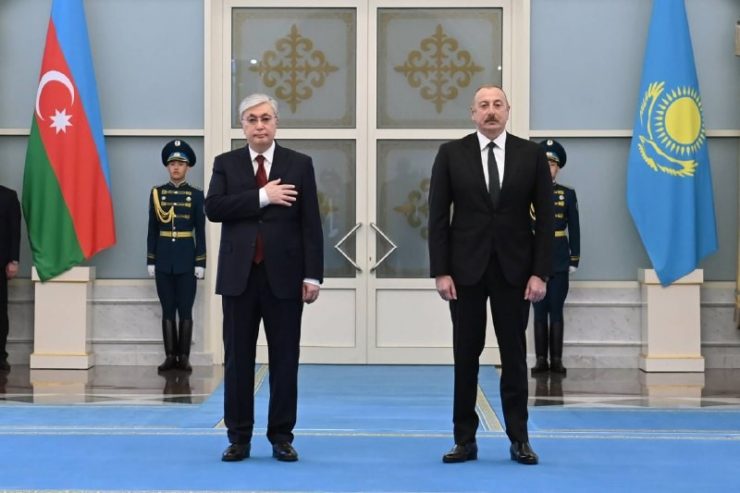
On 11-12 March, President of Kazakhstan Kassym-Jomart Tokayev paid a state visit to Azerbaijan, during which he met with the head of the Caspian state – I. Aliyev. Another important bilateral event that took place during these two days was the first meeting of the Kazakh-Azerbaijani Supreme Interstate Council.
In general, political contacts between Azerbaijan and Kazakhstan have been characterised by an enviable intensity over the past year. For example, the President of Kazakhstan visited Baku to participate in the first SPECA summit, and the head of Azerbaijan visited Kazakhstan as part of his participation in the OTS summit.
As expected, the talks focused on the prospects of developing cooperation between the two countries within the framework of the so-called Caspian (Middle) Corridor, an infrastructure project aimed at connecting the East and West of Eurasia via Central Asia and the Caspian Sea.
Over the past six months, the Trans-Caspian route has received support from its biggest potential beneficiaries, the PRC and the EU. The former during Tokayev’s recent visit to Beijing in October 2023. The latter – as part of the new Global Gateway transport and infrastructure initiative, which envisages significant investment in Kazakhstan’s transport infrastructure to create a continental route bypassing Russia. The recent inauguration of Kazakhstan’s cargo terminal in Xi’an, China, from which a railway train was remotely received by the leaders of the two countries in Absheron, also played a role in shaping the transport and infrastructure agenda of the Tokayev-Aliyev meeting. Obviously, these events largely determined the relevance of the current summit and the semantic content of the talks between Aliyev and Tokayev.
In addition to the development of the transit project, the parties discussed the possibility of increasing the volume of Kazakh oil exports through the territory of Azerbaijan – to Turkey and Europe. Within the framework of this promising area of cooperation, the parties signed an agreement on the gradual increase of the volume of transit of Kazakh oil through the territory of the Republic of Azerbaijan. No less significant “fruit” of the negotiations was the agreement on strategic partnership between the Samruk-Kazyna Fund and the Azerbaijan Investment Holding, which opens up the possibility for the countries to implement joint expensive projects.
Trade and economic relations between the two countries have been actively developing in recent years – Akorda reports that trade turnover between Kazakhstan and Azerbaijan has increased fivefold since 2020.
By rapidly developing relations with Azerbaijan, a promising continental transit partner of the Central Asian republics, Kazakhstan is probably trying to ensure its competitiveness as a transit state, especially vis-à-vis Uzbekistan, and thus strengthen its position in the race for the title of Eurasia’s transport “hub”. Such conclusions are inevitable in view of the recent upgrading of relations between China and Uzbekistan following Mirziyoyev’s visit to China in January 2024, as well as the promotion of Eurasian transport and infrastructure projects in which Kazakhstan’s participation is not envisaged: in particular, the China-Kyrgyzstan-Uzbekistan trunk line, the prospects for the construction of which were last discussed at a meeting of high-ranking representatives of the three countries in Ürümqi. Of course, Kazakhstan and Uzbekistan’s projects are not mutually exclusive, but the struggle between them for a significant share of Eurasian transit is becoming increasingly evident. Despite the fact that both countries are promoting a number of transport projects, they are still not discussing cooperation in this area, let alone “pairing” or “harmonisation”.
Kazakhstan is keen to ensure its participation in any configuration of Eurasian highways – and the strengthening of Uzbekistan’s transit role could relegate Astana to the background in all projects except the China-Kazakhstan-Russia-Europe highways. To be sure, the Republic’s authorities have been encouraged by EU initiatives to finance motorways through Kazakhstan, bypassing Russia, which were put forward at the Global Gateway forum held in Brussels in late 2023. However, they are doomed to fail without a strong political link between Kazakhstan and the countries of the Transcaucasus, first and foremost Azerbaijan.
From the point of view of harmonising the “Middle Corridor”, the parties have obviously achieved very significant results – a few days after the end of Tokayev’s visit, the foreign ministers of Georgia and Turkey came to Baku, with whom the Azerbaijani foreign minister signed the Baku Declaration, in which the issue of promoting the corridor is one of the key points. The successes in the Kazakh-Azerbaijani negotiations on transport issues undoubtedly had a positive impact on the trilateral negotiations.
Beyond the economic issues of bilateral relations between Azerbaijan and Kazakhstan, the sides demonstrate solidarity on a number of international political issues, including those directly related to their foreign policy. In particular, the President of Kazakhstan reiterated his solidarity with Azerbaijan’s resolution of the issue of the territorial integrity of the Republic, congratulating his colleague “on ensuring territorial integrity in accordance with international law and UN Security Council resolutions”. Incidentally, this is not just about ethnic-Turkish solidarity: Kazakhstan has long been interested in a de-escalation of the long-standing Armenian-Azerbaijani conflict, mainly from the point of view of optimising its export channels via promising routes through Transcaucasia.
This visit was also an act of developing a new interregional political-economic space: in the previous articles devoted to the results of the first SPECA summit and the 2023 OTS summit, the author spoke about the formation of a new international-political space of the “Turkic world”. Tokayev’s visit to Baku in March 2024 can also be seen in this context.
Following the meeting with the Kazakh leader, Ilham Aliyev received an invitation to pay an official visit to Astana this year in order to maintain and develop an intensive dialogue between the two states at the highest level.
Boris KUSHKHOV, Department of Korea and Mongolia, Institute of Oriental Studies, Russian Academy of Sciences. Especially for online magazine “New Eastern Outlook”
